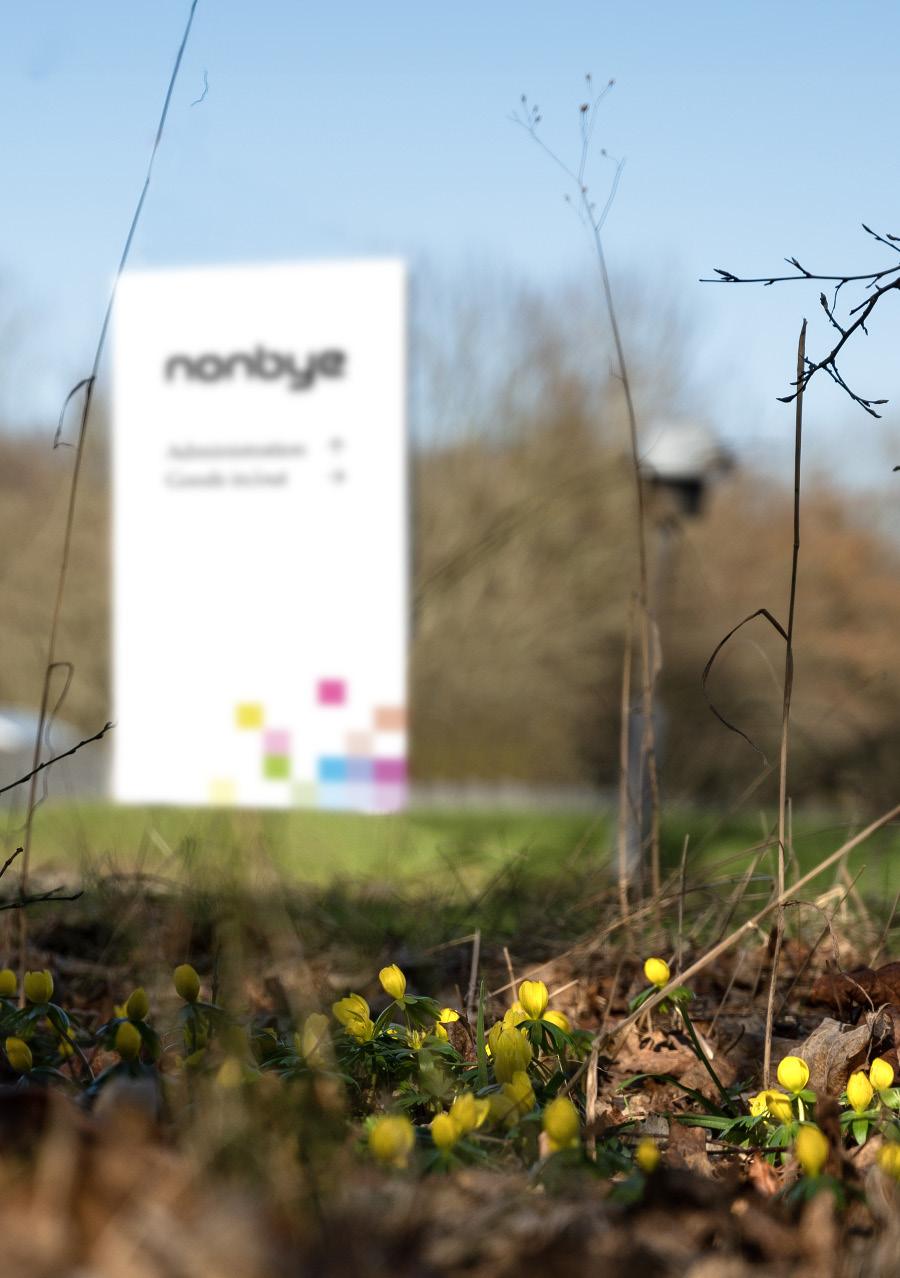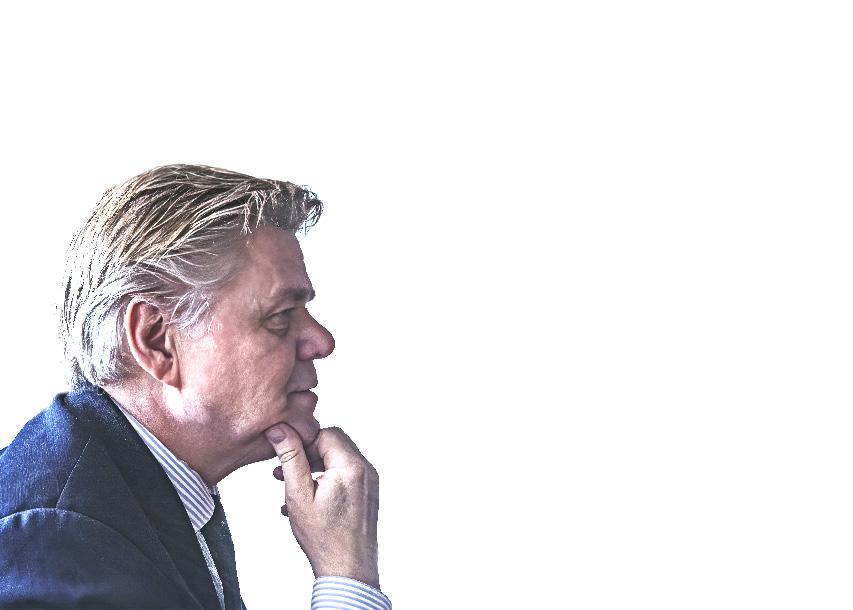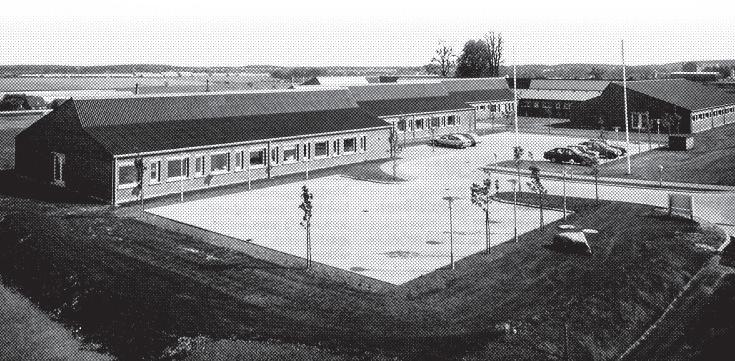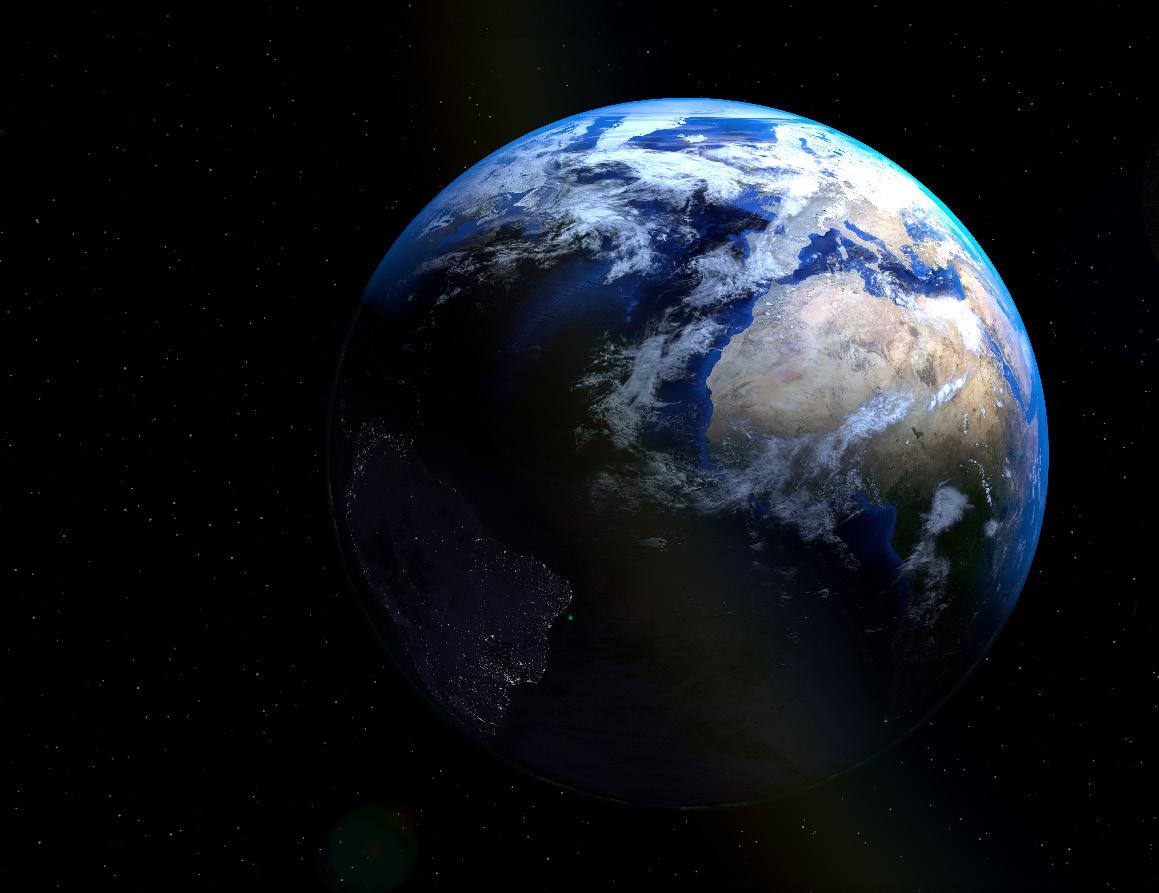

CSR-report 2024
About this report by Director Lars Nonbye
Decency and professionalism are important to us. We take pride in treating suppliers, customers and employees with decency and professionalism, that our products and service are of the highest quality and that we take responsibility for the society that we live in.
The decision to carry out the company’s first CSR report was taken because at Nonbye we are professional and decent, and because we want to
lead from the front with sustainable development in our industry. This means that we tell people about the initiatives we have undertaken over the years aimed at benefitting society, and that we set some ambitious goals for the future and that we act on these goals.
This is the overall picture that we want to describe in the report, which we will follow up on annually and update with new initiatives and goals.

For us it is a journey that started a long time ago and with this latest initiative, we increase our momentum and set our course. We do not know the final destination, but we will strive to ensure that Nonbye becomes as sustainable as possible.
We define the term sustainability as general social responsibility. It is our ability to see and act on the potential that exists, so that we can make a real difference.
As a production company, it is natural that we have a particular focus on our production activities.
This is where we have the greatest impact – and thus the potential to make the biggest difference. Here we have a particular focus on how we can improve our negative impact on the environment, work with a circular approach, and about how we can be an accommodating workplace for people who need to participate in the labour market in a specific way.
But we also have focus on even the small actions that make a difference, and any action that is beneficial to society is therefore in principle never too small, as long as such actions support the goals that the company has set.
This means that the report will contain both large and small initiatives that we shall work with and we will try to describe why the current and future initiatives are relevant to us as a company – and what differences we hope they make.
Through a longer process, we have worked with the UN’s Sustainable Development Goals, and the CSR report is based on the sustainable development goals because they are an excellent way of communicating, and because to an increasing degree, they are familiar to companies and the general public. From a company perspective, the sustainable development goals have also been good to work with because they provide a shared understanding and a shared language that we can communicate with. Translating your company into the sustainable development goals is a good exercise, because it can be difficult at times seeing what is actually beneficial to society. A lot of our operations are kind of “just something that we do”.
And returning to decency and professionalism – we want to operate the business in a responsible and considerate way: “The 17 sustainable development goals share one thing in common: sustainable development. Sustainable development is a way of living so that everyone else can live too. It isn’t an ideology. It’s education! “(Jens Wandel, UN)
The Nonbye company history
For more than 50 years Nonbye has supplied solutions in visual identity for a wide range of companies in Denmark, Sweden, Norway, Finland and Germany from our own companies, but has also supplied our products and solutions to the whole world.
Throughout our history we have been pioneers in the market in several areas.
The following is a timeline of the essential events that have laid the foundations for Nonbye as it exists today.

After a couple of years in Canada, Ole Nonbye returns to Aarhus to work as the manager at a local sign writing company.
It quickly becomes clear to Ole that he would prefer to be his own boss.
Ole Nonbye completes his apprenticeship as a sign writer at a sign company in Aarhus in Denmark and receives a silver medal for his apprenticeship exam.
Driven by curiosity and a passion for craftsmanship, Ole Nonbye travels to Canada to deepen his knowledge of the latest techniques in his new trade as a sign writer.
1965 is the year Ole establishes Nonbye in a basement facility below Brunsgaard Karrosserifabrik in Odder. With the new techniques and the knowledge gained in Canada, the company specialises in self-adhesive foils. The first major order is signed with Bang & Olufsen.
The world’s first computer-controlled lettering machine SpaceMatic is launched – the machine makes self-adhesive letters in complete words and sentences with perfect spacing between the letters.
Nonbye relocates, leaving the basement and moving to new premises with 100 m2 of space. Ole considers it one of the biggest decisions of his career.
A new and regular collaboration with foil supplier 3M is established. At the same time, Nonbye becomes the dealer of the “letter system” Voss-Text.
Ole Nonbye retires after 33 impressive years at Nonbye and proudly hands over the running of the company to his oldest son, Lars, and the company carries out another change in ownership, since Camilla, Per and Lars take over the company.
A generational change has taken place.
The company becomes ISO 9001 and ISO 14001 certified. Since its very beginning, the company has prioritised sustainability highly.
A new law stipulating that all Danish retail stores must have visible opening hours is adopted. Ole has an idea where the customers’ opening hours can be supplied as a single block rather than as loose letters and numbers.
A year later, SystemText becomes a reality and quickly gains trade status in the industry. In the same year the company moves to its own, newly built premises on Rønhøjvej.
Ole Nonbye is the first in Europe to introduce the possibility of digital printing in large formats.
Nonbye is the first winner to receive the newly established award for being the most inclusive company in Odder Municipality.
Nonbye introduces Brandpilot, which is an essential part of the company’s transformation to become a Brand Management company.
”We see what your customer sees”
A completely new sustainable and PVC-free foil is developed in a collaboration between Denmark’s largest toy manufacturer, Nonbye and 3M.
Nonbye is the first winner to receive the newly established Innovation and Design Award. Instead of neon and light tubes, LEDs are used to light letters and signs.
Nonbye decides to devise the company’s first CSR report and sets goals for how the company can work in a targeted fashion with initiatives for benefiting society.
Company profile
Nonbye’s idea base
We cover our customers’ needs for branding in the market through optimal and profitable technologies and systems.
We are Nonbye
We are a Brand Management company
We’re talking your brand language Your brand visibility matters to us
Nonbye’s mission
Our mission is to ensure that your customers see your brand at it’s best, everywhere.
Nonbyes vision
We want to be the preferred Brand Management company for visual branding in the Nordics – and further out.
Our values

Integrity - Everything we do is rooted in integrity
Authenticity - We are who we say we are
One team - We are one team, your team
Excellence - We strive for excellence in everything we do
Innovation - We are always looking for the best way to succeed
Balance - For a more sustainable future together
Business model
Nonbye has a scalable production capacity and can carry out sign tasks with very large volumes in-house.
Nonbye sells solutions directly to the end customer and via individual dealers in close cooperation agreements.
We are a market-oriented company, which provides innovative and creative visual identity solutions to our customers, and are consequently better than all of our competitors. We build long-term and profitable relations with customers and partners, producing predictable earnings for our owners and have a dynamic environment for our employees.
Nonbye’s strength lies in our many and flexible products and services, which together with
customers, we can combine to create creative and innovative identity solutions. From idea to finished installation. We deliver to entire value chain of visual identity solutions.
Our customers demand suitable visual identity solutions and often require project management with this. We increasingly see that our customers demand and place requirements about responsibility, especially relating to the environment and climate.
Nonbye sells, produces and supplies projects (visual identity solutions), where design, planning, project management and installation are executed in collaboration with partners and subcontractors.
Nonbye sells, produces, supplies and installs large complete projects, but we also carry out individual assignments.
Nonbye seeks to optimise our waste management and sells and sends surplus materials for circulation wherever and whenever possible.
Nonbye sells and produces specific assignments for customers, who receive the goods for own installation, etc.
Nonbye seeks to optimise administrative operations, so that they have the least possible negative impact on the environment, and so we have the minimum of expenses.
Nonbye sells, produces and provides the installation of decoration for cars, trains, planes, etc.
CSR Policy
Nonbye complies with national laws and international conventions on human rights.
Nonbye does not accept discrimination or harassment.
Nonbye does not accept child labour, neither in production nor among suppliers in Denmark or abroad.
Nonbye does not accept any form of corruption or bribery, neither internally in Nonbye nor externally in Denmark or abroad. Any failure to comply with this is grounds for immediate dismissal.
Nonbye does not accept whitewashing. We risk assess all customers, and only accept payment transactions from the customer to whom the invoice has been issued.
Nonbye does not accept subcontractors that fail to meet the same standards in relation to human rights, corruption and bribery.
Nonbye uses standard employment contracts with fixed organised working hours and termination of employment terms and conditions.
Overtime at Nonbye is by agreement and with payment.
Nonbye is prepared to create e.g. flexible jobs and thus help vulnerable people in the labour market.
Nonbye works actively to educate trainees in our area of work.
Nonbye encourages and contributes to fellowship among people at the workplace and in the local community.
Nonbye participates in and contributes to the positive development of the local community.

Environmental Policy

Nonbye is ISO 14001 certified – the environmental standard, and works positively to improve its environmental impact.
Nonbye will constantly seek to minimise the company’s impact on the environment in the form of active environmental work. Nonbye’s clear intention is that the company’s activities are carried out with a minimum pollution of the external environment, taking into account the company’s technical and financial options.
This means in practical terms that Nonbye:
Will maintain and improve the certified environmental system
Actively involve employees in the environmental work, in order to increase the company’s employees and selected customers’ knowledge and awareness of environmental improvements.
Continuously seek to develop, produce and market more environmentally-sound products, services and solutions. Will always comply with applicable environmental legislation and regulatory requirements.
Social responsibility and stakeholders
The above table outlines how we view our potential options for action for each of our stakeholders in order to achieve a good collaboration.
In our efforts to be a decent, professional and responsible company, we work to ensure that we meet the expectations that our stakeholders have with regard to us. Stakeholder Stakeholder
Stakeholder/comment
Want to have good working conditions and the possibility of developing.
+ any nearest
Want to be confident that Nonbye is a safe workplace.
Every year we conduct an employee satisfaction survey and follow up on this.
The next will be in 2022.
We have a staff association, which works to strengthen a sense of fellowship at the workplace.
We are investing in our canteen scheme, because we know that our employees value this.
From 2020 and onwards, we are focusing on how our employees can move more when they are at work.
We have an active working environment committee.
We have completed courses in defibrillator and first aid.
We offer employees health insurance.
We ensure earnings by developing the company.
Wish to increase the value of the company.
Have a strong desire to operate the company on a foundation of decency and professionalism.
We ensure the right balance between turnover and costs.
We have focus on new opportunities – The market, products and services.
We want to use CSR to develop the company.
Suppliers
Stakeholder/comment
Expect stable deliveries.
Expect first-class products.
Expect that we act flexibly in relation to projects.
Want an attractive price.
Expect us to be able to meet their desire for sustainable products.
We consider our suppliers as partners, but we also have clear expectations (and place requirements in this regard) that they can supply in accordance with our wishes.
Authorities
Compliance with rules.
Development of society.
A. Environmental authorities
Neighbours
Environmental management system.
Decent and professional business management. Quiet, stable, tidy and orderliness.
We ensure that we have talented, educated and motivated employees. We work constantly to have good supplier agreements.
We ensure that our production equipment is up-to-date.
We actively offer PVC-free foils and sustainable solutions.
We assess our suppliers once a year.
In our assesment, we will opt for the suppliers that offer sustainable solutions.
We comply with all applicable regulations and keep up to date on developments, new rules, regulations and opportunities relevant to our business.
We are ISO 9001 and ISO 14001 certified, ensuring good environmental management.
We invest in staff tasked with providing for the surroundings. In the long term, our transport will transition to electricity, thereby reducing pollution and CO2 emissions.
Nonbye action (what do we do?)
Nonbye action (what do we do?)
The Sustainable Development Goals
It is important for Nonbye that we never stand still. This applies to the development of our company and in the way we deal with our social responsibility. This is why in this report we have outlined specific initiatives with concrete goals for how we can contribute to the sustainable development of society in the future. In this way, we can see when we succeed.
We have chosen to take the UN’s Sustainable Development Goals (SDGs) as our starting point, because they are a framework with a global perspective. They allow us to position the company in a global context, where it becomes very clear – also for ourselves – where we can create value in relation to sustainability. The SDGs help us to aim our gaze and look out at the world, where some of our initiatives can also help to make a difference.

We have determined that our best options to contribute to sustainable development are in connection with SDGs 3, 7, 8, 12 and 17.
All of these SDGs goals are a natural extension of our values and in the way we operate our business.
In the following we describe in detail how we have so far contributed to each of the SDGs and how we want to contribute in the future.
Sustainable Development Goal 3
Good health and well-being
We want to increase our contribution in ensuring that our employees can live a long and healthy life and we have started a number of initiatives to support this.
Health insurance
Every employee at Nonbye is offered health insurance. This ensures that employees and their children have the option of accessing the necessary health programme when it is relevant.
For salaried staff and employees with terms and conditions similar to salaried staff health insurance is compulsory, and payment is deducted from their salary for this.
Healthy canteen provision
Our employees in Odder are very satisfied with our canteen, which many consider a significant employee benefit. Therefore, it is important that our canteen offers food that all of our employees can enjoy. And since people are different, so is the food that is on offer.
Among other things, we endeavour to ensure that the buffet includes a healthy alternative, which the employees can choose if they so wish.
The canteen likes to purchase locally, and so we also work to reduce food waste.
In this regard we collaborate with DAKA Refood, which collects organic food waste and uses it to produce biogas and natural fertiliser.
Fewer chemicals
Chemicals have traditionally been used to ensure high quality and durability of our serigraphy and printing tasks.
We have already taken major steps towards production without chemicals. In 2020, we ceased our own serigraphy production.
We want to take a broader look at chemicals, so that we make sure that our and other companies’ employees are protected as much as possible.
Sick leave
We have a goal to continue to have a sickness absence of less than 2%. If an employee has an atypical absence pattern, we hold a “care conversation” to determine if there is anything in our working environment, physical og mental, which may be reason for the absence.
Initiatives:
1. Chemical-free production by 2030
We continue with our work to eliminate chemicals from production, and our stated goal with this CSR report is that by 2030 at the latest, we will have removed all hazardous chemicals from production, this applies to in-house production and production at our subcontractors.
If we are to achieve this goal, it also means that we need other companies to contribute to the development of new methods and products, but we will also contribute to this, when possible.
2. New technology in the production
We will continuously invest in new technology in the production that saves resources.
3. Overview of chemicals
We will continue work on the project that will form the basis for our finding of chemical-free solutions in the future. We will also have an ongoing overview of whether there are available solutions that are less hazardous than our current solutions. This can be a step in that direction.
4. Cleaning that is Nordic Swan Ecolabel certified
We now only use Nordic Swan Ecolabelled products for both external and internal cleaning.
5. Psychological work environment
Over the next year, we will implement measures to map and improve the psychological work environment.
Sustainable Development Goal 7
and clean energy Sustainable Development Goal 8
We already have all of our electricity supplied by Danish wind turbines and have a WIND certificate from Norlys. We believe that greater demand creates the right offer, and therefore we have chosen to invest in the certificate.
Our goal is that every year we will reduce our energy consumption by 5%. This is good for the environment and financially sound. Our energy bills are reduced, and we use less energy.
We are ISO 14001 certified, which ensures good environmental management, and every year we improve our impact on the environment.
We are underway with the replacement of lighting with LED lights, which is a sensible thing to do.
In addition, we constantly endeavour to adjust our server capacity, so that we do not use power and materials unnecessarily for operating our systems.
The office in Taastrup is furnished with recycled furniture and lamps.
In addition, we are reusing our desks. This is good for the climate and financially sound.
In addition, at Taastrup, we only use LED lighting and we have self-regulating lighting. We have also produced the decorations for the office – naturally in PVC-free foils.
Initiatives:
1. Reduce energy consumption by 5% We will continue to reduce our energy consumption by 5% per year.
2. Charging station in Odder We will ensure sufficient charging points in Taastrup, and set up charging points in Odder.
Decent work and economic growth
Nonbye wants to be a leading and responsible company in the local area. We will continue to have employees who have special needs and potential limitations at the workplace, and every single employee makes an important contribution to the company.
We will continue to seek ways of bringing more people into the labour market.
Nonbye wants to ensure an optimal working environment for all employees at all times. The company’s Working Environment (WE) Committee has the day-to-day responsibility of ensuring we constantly develop and improve our working environment and we have the following processes that take effect if necessary.
Work accidents
Should an accident occur at work, the WE Committee works together and analyses the background to the accident, and in particular which initiatives are necessary to prevent any repetition or incidents. At the quarterly WE Committee meeting, any developing trends are assessed with regard to accidents, and preventative measures are taken based on the assessment.
Education and training
The company prioritises education highly, and we believe that it is necessary in order to achieve the set department goals.
We continuously clarify the need for education and training in close dialogue with the management and employees.
Job relevant education in the future will also be expected to be supported (e.g. bachelor of commerce, diploma in specialised technical studies, and language courses). We work a great deal to ensure we are a decent workplace, one that also provides opportunity for people on the fringes of the labour market, but we also seek to aim our gaze at the world, to see where we can have an impact.
Initiatives:
1. Higher start wage
We have decided that the start wage at Nonbye shall be increased, and we have devised guidelines for how wages will be regulated on an ongoing basis, so that we ensure equal pay for equal work.
2. More trainees
We will support successful apprenticeships and hire students as needed.
In order to this, we have developed a concept for a traineeship which among our things, ensures alignment of expectations, ongoing meetings and that the trainees feel well prepared for the tasks that they are given.
Sustainable Development Goal 12
Responsible
consumption and production
As a production company, it is important that we always try to find solutions so that our production has the smallest possible impact on the world. Our long-term ambition is that our production will only use sustainable materials, but there is a long way to go and we do not yet know the way ahead.
Today we work systematically to always seek solutions together with and for the customer, which take the environment and sustainability
Initiatives:
1. Sustainable office supplies
We purchase sustainable office supplies from companies who have these products.
2. Digitalisation of production information
Our process management in production is currently done on paper. This has an impact on the environment, and sometimes there are errors. We are therefore initiating a digitalisation project, which will significantly reduce our consumption of paper and at the same time ensure fewer errors in production.
3. Principle for personal technical aids
To avoid excessive consumption, we are introducing a minimum of 3-year principal on personal technical aids – for example, telephones, laptops and computer glasses.
4. Sale and purchase of used IT equipment
We will sell our old IT equipment and purchase used IT equipment where this is relevant. Today there are many companies that specialise in the purchasing, cleaning, updating and reselling of used IT equipment. This results in a much-reduced impact on the earth’s resources, and we also expect to save money on equipment.
into consideration as much as possible. For example, as when we removed serigraphy and with our ongoing reduction in energy consumption. But we are also looking at other possibilities.
We will always need to consume because this is our core business, but we can consume smarter, and we can devise circular solutions where this is possible.
Sustainable Development Goal 17 Partnerships For the Goals
5. Solution for Empty Ink Tanks
Currently, it is not possible for the supplier to send our ink tanks into recirculation, but the project is maintained as a survey project.
6. Labelling of all conversion materials
All of the materials used in production shall be labelled, so that they are traceable and a product’s impact becomes transparent to us, suppliers and customers. This will make it easier for our sales representatives to promote the most sustainable options.
7. CO2 calculation
Our main impact is as follows:
a. Total electricity consumption 578.338 kWh, equivalent to 76,3 T Co2. (slope 2)
b. Foil PVC - ca. 102.195 m2, equivalent to 1.118 T Co2. (slope 3)
c. Folie non PVC (PE, LD) – 88.847 m2 , equivalent to 143 T CO2. (slope 3)
d. Folie/ Plast affald – 10.920 KG, equivalent to 19,512 T CO2. (slope 3)
e. Småt og stort brændbart – 13.540 Kg, equivalent to 21,664 T CO2 . (slope 3)
We will indicate the carbon footprint of our consumption in production, even if we are not the consumers of the material.
We collaborate with DAKA Refood, which collects our organic food waste and uses it to produce biogas and natural fertiliser.
We collaborate with 3M on the development of new and more sustainable foils.
In general, we believe strongly that partnerships are the way forward in finding new solutions. Therefore, this is something we constantly look at in all areas of the development of the company.
We continuously work with partnerships, authorities, suppliers and customers to introduce good and more sustainable to some of the challenges we all face.
Aim our gaze at the world and see where we can have an impact.
Initiatives:
1. Formal collaboration with local municipalities We want to determine whether entering into more formal collaborations with the municipalities with regard to people on the fringes of the labour market makes sense. Our first action, is reaching out.
2. Waste sorting of plastics
In cooperation with an external company, we arrange sorting of plastic into several fractions to achieve a better recycled value.
3. Cooperation with educational institutions
We have established cooperation with technical colleges in the promotion of the education of trainees.
Goals and expectations for 2024
Based on the above, we have the following overall goals for 2024.
1. We will adjust our purchasing where possible, so we have the smallest impact possible. . We want an overview of how much smaller our impact is from this change. It could be how much less IT waste we produce and how much we save by this.
2. We will carry out both sales and purchases of used IT equipment where applicable.
3. We are working with our waste management, so that we are part of more circular solutions.
4. We are able to communicate our CSR project to our suppliers and customers, so that we can influence them in making more sustainable choices.
5. We are able to communicate our CSR project internally, so that our employees know what our ambitions are and why we have them. And they therefore have the possibility of contributing with good ideas for solutions.
6. We want to have a baseline in place for relevant CO2 emissions and continuously calculate our own emissions according to the standards.
7. We want to focus on the psychological work environment and to increase the well-being of employees.
Risks
Nonbye uses Failure, Mode and Effect Analysis (FMEA) with regard to risk considerations. The following topics are chosen:
Stress at the workplace – shall be countered by drawing attention to well-being, overview of competencies and good contact with all employees.
The supplier collaboration, which is a requirement for ensuring good materials, requires sufficient focus from the company and the suppliers. Risk of supplier dropout and poor performance. The suppliers are assessed on an ongoing basis and reported yearly, including with their CSR contribution.
Technological development is necessary for the delivery of sustainable, competitive products.
Nonbye shall endeavour to be at the forefront, so that technological gaps do not endanger sustainability or the company.
Nonbye’s engagement in sustainability can be put under pressure if cases arise that can lead to negative publicity in the press or on social media platforms. Nonbye’s management is aware of this aspect.
The initialisation of CSR initiatives may turn out to be too costly to carry out. It is a requirement that the CSR initiatives are financially viable in relation to the company’s financial reality.
CSR initiatives that have started may prove to be impossible to implement because the partners’ lack the abilities or resources to implement the projects.

